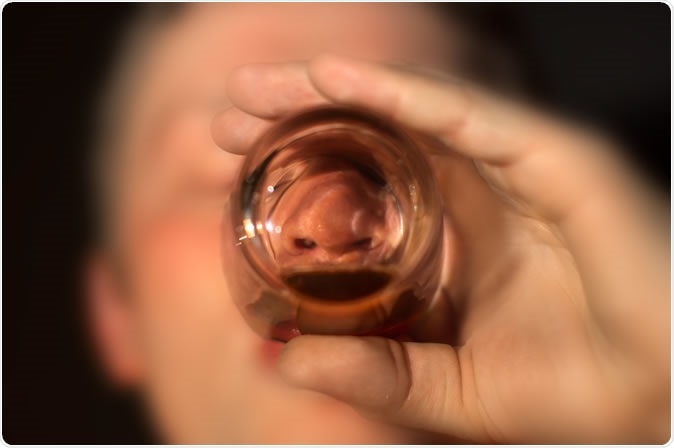Exposure to high levels of alcohol in adolescence may shape adult behaviors, predisposing them to a higher risk of anxiety and alcohol abuse later in life, a new study found.
A team of researchers at the University of Illinois revealed that teenage drinking could influence behaviors during adulthood due to gene expression changes in the brain, leading to vulnerability to anxiety and alcohol abuse in adulthood.

Image Credit: Milias1987 / Shutterstock
Effects of alcohol on the brain’s gene expression
The study, published in the journal eNeuro, shows that experiments in mice revealed that exposure to alcohol manifested high levels of miR-137 or microRNA-137, which is a short non-coding RNA molecule that works by regulating the expression of other genes by several mechanisms.
Teenage exposure to high amounts of alcohol modifies gene expression in a manner wherein it increases the predisposition to alcohol use disorders and anxiety in adulthood. Previous studies also found that microRNA is linked to how early binge drinking can alter the brain.
In the current study, the researchers unveiled that teenage exposure to alcohol altered neural connectivity in the amygdala, the area of the brain tied to anxiety. Though microRNA has been widely known to modify gene expression, the exact mechanisms were unknown.
Increased anxiety and alcohol preference
The investigators used laboratory mice to shed light on how alcohol affected the microRNA in the amygdala. To land to their findings, the team exposed adolescent rats to alcohol and measures the resulting levels of miR-137 in the amygdala. They found that alcohol exposure increased the levels of miR-138, leading to a lower expression of certain proteins that are important in the growth and branching or healthy neurons.
“MicroRNA-137 is an important part of normal brain development, but when young brains are exposed to high amounts of alcohol intermittently, as happens with binge drinking behavior, the molecule’s regular function is altered. By altering microRNA-137 levels, binge drinking rewires the brain,” Subhash Pandey, professor of psychiatry and director of the UIC Center for Alcohol Research in Epigenetics, said in a statement.
To see if inhibiting miR-137 can resolve and reverse the adult behaviors, the team controlled and inhibited miR-137 in the amygdala. They were able to reverse anxiety and alcohol preference in rats, shedding light on how damaging early exposure to alcohol is to the brain.
“Adolescent binge drinking is dangerous and has long-term epigenetic effects on the brain. Understanding this mechanism helps us get one step closer to understanding how those effects happen and how we can potentially undo that damage,” Pandey added.
Early alcohol exposure and mental health
The findings of the study highlight the effects of alcohol in the brain, and subsequently, to mental health. Alcohol abuse problems are common conditions among many people across the globe.
Alcohol is a toxic and psychoactive substance that can lead to dependence if it’s not controlled. Alcohol consumption contributes to about 3 million deaths annually in the world. The World Health Organization (WHO) reports that more than a quarter of 26.5 percent of all adolescents who are 15 to 19 years old are current drinkers. That’s about 155 million teenagers across the globe.
The researchers suggest that targeting the microRNAs can provide a new way to reverse the damage of alcohol use during the teenage years. Also, it shows that teenage drinking can alter the brain by modifying gene expression, resulting in many abnormalities.
The study also sheds light on how teenage drinking can affect the brain. This can help provide preventive measures early on to reduce exposure to high levels of alcohol, which, in turn, can lead to mental health problems in the future.
Source:
World Health Organization (WHO). (2018). Global status report on alcohol and health 2018. https://apps.who.int/iris/bitstream/handle/10665/274603/9789241565639-eng.pdf?ua=1
Journal reference:
Kyzar, E., Peyton, J., Zhang, H., and Pandey, S. (2019). MicroRNA-137 drives epigenetic reprogramming in the adult amygdala and behavioral changes after adolescent alcohol exposure. eNeuro. https://www.eneuro.org/content/early/2019/11/18/ENEURO.0401-19.2019